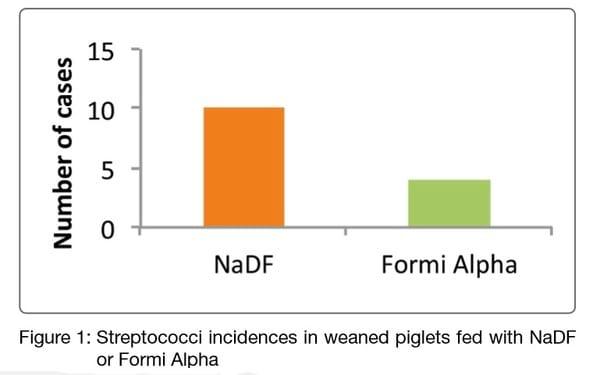Sodium diformate and alkoloid-based feed additives on growth performance and streptococcus infection in weaned piglets
Published: October 17, 2016
By: Christian Lückstädt , ADDCON
Introduction: Potassium diformate, a double-salt of formic acid, has been shown in numerous trials to improve health and performance in piglets, growing-finishing pigs and sows. Thus, potassium diformate (KDF) has been approved in the European Union as the first non-antibiotic growth promoter for use in swine. The effect of KDF is often described as digestibility enhancing and strong antimicrobial. Similar effects have been demonstrated with sodium diformate. However, the antimicrobial impact of organic acids and their salts is mainly directed against Gram-negative bacteria. On the other hand, specific plant extracts, containing isoquinoline alkaloids, are known to have a broader antimicrobial activity (OPLETAL ET AL., 2014), also against Gram-positive bacteria and are positively influencing the performance of weaning pigs as well (KANTAS ET AL., 2014). Therefore, the current study tested the efficacy of a blend of sodium diformate with alkaloids (traded as Formi® Alpha), compared to sodium diformate (NaDF) alone, in weaned piglets in a commercial farm with regular Streptococci infections.
Material and methods: 130 piglets of the same breed and age (weaning at day 21), with initial weights ranging from 5.9 to 6.1 kg were allocated to two equal groups at a commercial farm in North Rhine Westphalia and fed a commercial diet mainly based on barley (43%), wheat (30%) and soybean extraction meal (20%). The positive control diet contained 0.49% NaDF, while the test diet included 0.49% of a NaDF-alkaloid blend (which contained 20 g plant-based alkaloids per kg product). Feed and water were available ad libitum. At the end of the trial after 40 days, all piglets were weighed and performance parameters were measured. Cases of streptococcus infection were recorded. Results were analysed using ANOVA.

Results and conclusions: No mortality occurred during the trial. The final weight of piglets after 40 days of rearing did not differ from each other (Table 1). Both groups reached a mean final weight of 15.1 kg. Furthermore, also the FCR did not differ between treatments (1.43 for positive control v. 1.42 for test diet) - (P>0.05). Therefore, both – the acidifier as well as the acidifier-alkaloid diet achieved similar performance parameters.

However, use of alkaloids in the diet lowered the number of cases of streptococcus infections significantly (10 and 4 cases in positive control and treatment groups, respectively, P<0.05; Figure 1). This led to a 60% reduction of antibiotic treatment (Duphamox®) on farm during the trial in the NaDF-alkaloid (Formi® Alpha) fed group. The performance data are supported by a holo-analysis; an analytical model based on all available trial data on acidifiers, including formic acid and diformate. The analysis of potassium diformate (KDF) data separately showed a significant improvement in performance in response to KDF inclusion into the diet, (Rosen 2008, reported by Lückstädt and Mellor, 2010). It can be assumed safely that the impact of sodium diformate (NaDF) will have a similar magnitude in swine diets.
On the other hand, the addition of the alkaloids to NaDF caused a significant improvement of the health status of piglets. Especially the impact against the Gram-positive Streptococci is noteworthy. This is particularly important since the EU-funded Focus Group is calling for actions to reduce the use of antibiotic treatments on swine farms (eip-agri, 2014). In general it can therefore be stated that the above findings support the use of dietary sodium diformate, as well as the NaDF-alkaloid blend as an effective and sustainable growth promoter in piglets under European conditions. The blend with the alkaloids may in addition express a beneficial impact against harmful pathogenic Gram-positive bacteria and has therefore a supporting function for the EU-antibiotic reduction initiatives.
Related topics
Authors:
ADDCON
Recommend
Comment
Share

Would you like to discuss another topic? Create a new post to engage with experts in the community.






.jpg&w=3840&q=75)